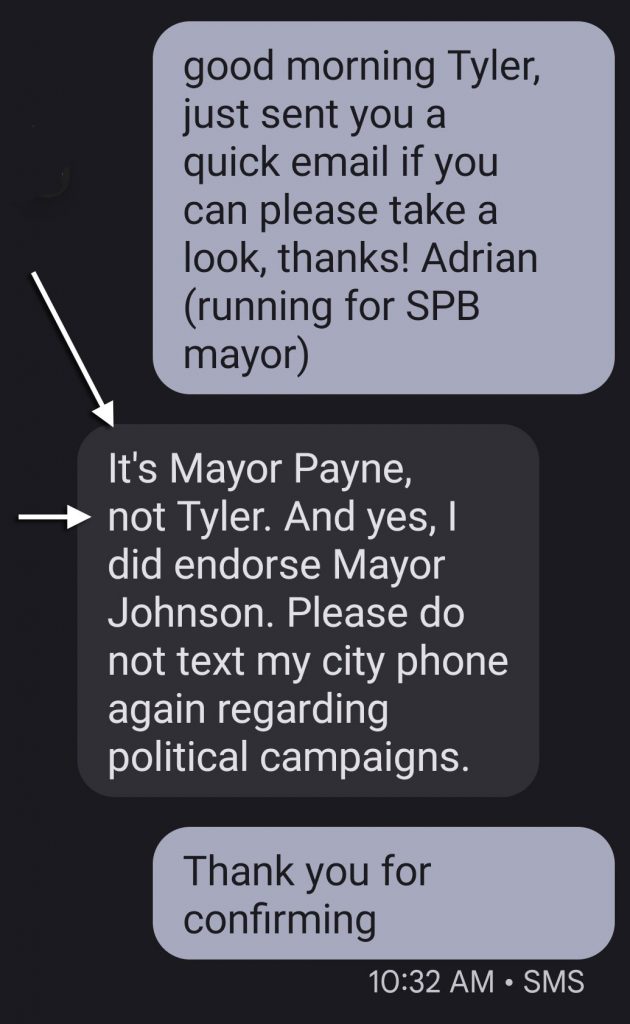In developing information for another article we are working on, we discovered that Treasure Island Mayor Tyler Payne told a citizen “It’s Mayor Payne, not Tyler” in a text message. However, Payne doesn’t address others in the formal fashion he insists on, including in an email to us within one hour of his text message. Details below.
When Paradise News arrived in St. Pete Beach mailboxes yesterday, some residents noticed this page of a two-sided insert in which current St. Pete Beach Mayor Alan Johnson claimed to have a dozen endorsements from local elected officials. The sheet included an alleged endorsement from County Commissioner Brian Scott, an untrue claim we reported on yesterday.
Yesterday, Johnson met with and apologized to Scott after posting his untrue claim on Facebook. In response to our question “how else did you distribute” the untrue claim, Johnson told the Guardian in an email that “to [his] knowledge,” the untrue claim of endorsement had not been distributed elsewhere.
We will report further on this evolving story involving Johnson’s apparent and multiple Florida Campaign law violations, specifically violations of FS 106.143(4). That statute requires candidates to have the endorsement in writing before announcing them.
It trying to obtain the necessary records for that upcoming follow-up story, we requested copies of the written endorsements from those Johnson claims to have been endorsed by. In that process, we obtained the response that Johnson’s opponent in the mayoral race, Adrian Petrila, obtained from Treasure Island mayor Tyler Payne when inquiring about the matter

After addressing him as “Tyler,” Payne responded with “It’s Mayor Payne, not Tyler.” This is noteworthy, especially given that Payne within the hour wrote to this reporter and referred to him by his first name.
So much for Payne’s insistence on adherence to formality.
In his response to Petrila, Payne also complained that Petrila contacted him on his city cell phone about a political campaign. Payne has not provided a phone number or email address to contact him about campaign law compliance matters. In our email to Payne and others yesterday, we invited all to “please move this email conversation to your non-city email address if you prefer” because we “don’t have that email address for most of you.”
Payne did respond to our request for the endorsement form, but he did not respond to the public records we made for his text messages with Petrila. We were able to obtain them anyway.
Johnson’s opponent Adrian Petrila had also tried to obtain copies and mentioned to the Guardian that he the only response he received was “a snarky response via text message from Tyler Payne,” the Mayor of Treasure Island. When asked, Petrila would not provide the text message, causing us to make a public records request for the communications to Payne directly.
When Payne did not respond, we also requested them via email from the Treasure Island city clerk’s office. When they failed to respond, we returned to Mr. Petrila and explained that anyone who has “custody” of a public record, including Petrila, must provide the record to anyone requesting it. Petrila then provided it to us.
After being elected two years ago, Payne said he wanted to wants to improve communications between the city and residents. However, his stated desire apparently doesn’t include improved (or even good) communications with residents of neighboring towns who one day may become their mayor.
Payne may be continuing a long but troubling trend in Treasure Island of public officials thinking they can do as they please, including break the law. In 2016, then city manager Reid Silverboard called the police on resident Ken Weiss who said things at a town hall that Silverboard didn’t want said. Treasure Island police provided the storm troop response, and refused to answer questions about their actions.
In 2014, the city lost a lawsuit after allowing illegal parking on the beach. It was doing so in order to make life miserable for certain hotel owners on the beach so that they would be forced into selling their properties to a powerful local developer. In common parlance, that’s called “racketeering” and usually results in people going to prison.
Is our publication a rapid dog, an attack dog, or is it the guard dog it seeks to be?
As always….the Guardian reports and our readers decide. Like our Facebook page to find out when we publish articles.
UPDATE: approximately 30 minutes after this article went live, the city finally provided the text message exchange we asked for. It served as important confirmation of what we already had, but came only after we had to “lean on” Payne quite heavily to produce the records. We may report further on what took him so long.



